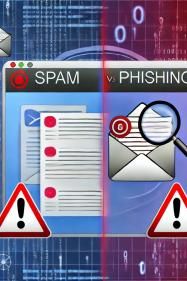Spear phishing is a targeted and highly deceptive form of phishing that cybercriminals use to gain access to sensitive information. Unlike regular phishing attacks, which involve sending mass emails to large groups, spear phishing focuses on specific individuals or organizations. By understanding the spear phishing definition and the tactics used, you can better safeguard your personal and company data.
What is Spear Phishing?
Spear phishing is a personalized phishing attack where attackers use social engineering techniques to deceive a specific target. These attacks are carefully crafted to appear as legitimate communications from a trusted source, such as a colleague, friend, or an organization's internal department.
Attackers often conduct extensive research on their targets, gathering details from social media profiles, professional networking sites, and company websites. This information allows them to create emails that seem credible and authentic, significantly increasing the chances of success.
How Spear Phishing Works
Spear phishing emails are designed to bypass standard security filters and exploit human vulnerabilities. Here’s how a typical spear phishing attack unfolds:
Research: The attacker identifies a specific target, such as an employee at a company, and gathers information about their role, colleagues, or ongoing projects. This research helps them craft a convincing message.
Crafting the Email: The attacker creates an email that appears to be from a known contact, like a manager, HR representative, or a business partner. The email may include personalized details, making it appear legitimate and urgent.
Execution: The email typically contains a link to a fake login page, a malicious attachment, or a request for sensitive information, such as login credentials, financial details, or confidential documents.
Exploitation: Once the target responds or interacts with the email, the attacker gains access to the requested information or injects malware into the target's system, allowing further infiltration.
Common Signs of Spear Phishing
Personalized Content: Spear phishing emails often include the recipient's name, job title, or other specific details to appear more convincing.
Urgent Requests: The email may convey a sense of urgency, pressuring the recipient to take immediate action, such as transferring funds or providing sensitive information.
Unusual Sender Addresses: While the sender's name might seem familiar, the email address may have slight variations or come from an unexpected domain.
How to Protect Against Spear Phishing
Spear phishing is sophisticated, but there are effective ways to protect yourself and your organization:
1. Verify Requests for Sensitive Information
Always verify any request for sensitive information, especially if it seems unexpected. Use an alternative communication method, such as calling the sender directly using a known phone number, to confirm the request's legitimacy.
2. Inspect Email Addresses and Links
Carefully examine the sender's email address for subtle discrepancies. Hover over links to reveal the actual URL destination. If the link or address looks suspicious, do not click.
3. Implement Multi-Factor Authentication (MFA)
MFA provides an additional layer of security by requiring a second form of verification, such as a code sent to your phone. Even if an attacker obtains your login credentials through spear phishing, they will need the second factor to access your accounts.
4. Educate and Train Employees
Understanding spear phishing : awareness is the most powerful defense against spear phishing. At Arsen, we provide comprehensive awareness training that includes simulated spear phishing attacks to help employees recognize and respond to targeted threats.
Conclusion
Spear phishing is a highly targeted email threat that exploits trust and familiarity to deceive individuals into revealing sensitive information. Unlike traditional phishing, it focuses on specific targets using personalized tactics. Recognizing the signs of spear phishing and implementing protective measures, such as verifying requests and using multi-factor authentication, can help safeguard your information.
Arsen offers next-generation awareness training to arm employees with the skills needed to detect and avoid spear phishing attempts.

